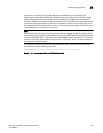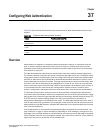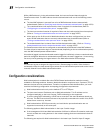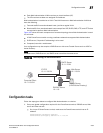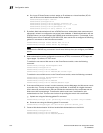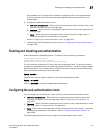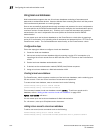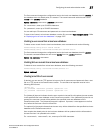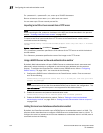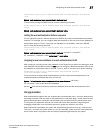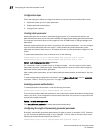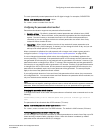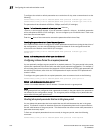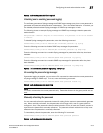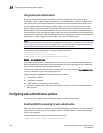
PowerConnect B-Series FCX Configuration Guide 1313
53-1002266-01
Configuring the web authentication mode
37
The first command changes the configuration level to the local user database level for userdb1. If
the database does not already exist, it is created. The second command adds the user record
marcia to the userdb1 database.
Syntax: username <username> password <password>
For <username>, enter up to 31 ASCII characters.
For <password>, enter up to 29 ASCII characters.
You can add up to 30 usernames and passwords to a local user database.
To view a list of users in a local user database, use the CLI command vlan-mod-port-userdb. Refer
to “Displaying a list of local user databases” on page 1337.
Deleting a user record from a local user database
To delete a user record from the local user database, enter commands such as the following.
PowerConnect#(config)#local-userdb userdb1
PowerConnect#(config-localuserdb-userdb1)#no username marcia
The first command changes the configuration level to the local user database level for userdb1.
The second command deletes the user record marcia from the userdb1 database.
Syntax: no username <username>
Deleting All user records from a local user database
To delete all user records from a local user database, enter the following command.
PowerConnect#(config-localuserdb-userdb1)#delete-all
Syntax: delete-all
Creating a text file of user records
If desired, you can use the TFTP protocol to import a list of usernames and passwords from a text
file on a TFTP server to the PowerConnect switch. The text file to be imported must be in the
following ASCII format.
[delete-all]
[no] username <username1> password <password1> <cr>
[no] username <username2> password <password2> <cr>
...
The [delete-all] keyword indicates that the user records in the text file will replace the user records
in the specified local user database on the PowerConnect switch. If the [delete-all] keyword is not
present, the new user records will be added to the specified local user database on the
PowerConnect switch. The [delete-all] keyword is optional. If present, it must appear on the first
line, before the first user record in the text file.
The optional [no] keyword indicates that the user entry will be deleted from the specified local user
database on the PowerConnect switch.
User records that already exist in the local user database will be updated with the information in
the text file when it is uploaded to the switch.
For <username1>, <username2>, etc., enter up to 31 ASCII characters.



